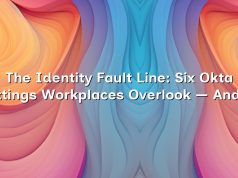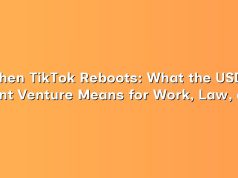Kaja Whitehouse’s Promotion and the New Face of Legal Coverage for Workers
Business Insider has named Kaja Whitehouse editor of its Legal Affairs team. It’s a move that matters not only to newsroom insiders but to the broader workforce: legal coverage shapes how people understand workplace rights, corporate accountability, and the evolving boundaries of employer power. Whitehouse, who joined Business Insider in August 2021 as senior finance editor and later served as deputy business editor, now steps into a role that will define how legal stories reach the people who need them most — employees, managers, and the professionals who navigate the modern workplace.
Why this promotion is more than a headline
At first glance, promotions are internal affairs — a recognition of skill, judgment, and leadership. But when a prominent newsroom elevates an editor to lead legal coverage, it signals editorial priorities and a judgment about what readers need. For the Work news community, that matters in concrete ways:
- It strengthens the bridge between complex legal developments and practical workplace implications.
- It underscores the importance of translating court rulings, regulatory shifts, and corporate legal strategies into actionable intelligence for employees and leaders.
- It elevates the role of journalism in holding institutions accountable, illuminating how legal outcomes reshape day-to-day work.
From finance desks to legal affairs: a lesson in cross-disciplinary agility
The trajectory from senior finance editor to leading legal affairs is illustrative. Finance and law are different languages, but they share a common object: institutions and the rules that govern them. A background in finance sharpens an editor’s ability to read incentives, parse disclosures, and identify systemic patterns. These skills translate well to legal coverage, where understanding motive, consequence, and precedent is essential.
For professionals thinking about their own careers, Whitehouse’s move is a reminder: lateral shifts — not just vertical promotion — often accelerate impact. Deep subject knowledge matters, but so does the capacity to learn adjacent domains, synthesize complex material, and communicate it clearly to diverse audiences.
What strong legal journalism does for the workplace
High-caliber legal reporting is not just for lawyers. It equips workers with context about rights and risks, helps managers anticipate compliance challenges, and gives HR and operations leaders the raw material they need to make fairer decisions. Under focused editorial leadership, legal coverage can:
- Clarify how policy changes affect ordinary employment contracts and benefits.
- Expose patterns in corporate behavior that affect safety, fairness, and equity.
- Demystify litigation trends — for instance, what a surge in a particular kind of lawsuit means for industry hiring, classification, or pay practices.
Values that shape trustworthy coverage
Readers look to legal journalism for accuracy, fairness, and clarity. An editor leading a legal team sets the tone for how those values are enacted. That includes insistence on:
- Precision in language — legal terms matter and are often misunderstood. Accuracy reduces harm.
- Contextual reporting — a verdict or ruling is rarely an isolated moment; it sits atop a history and produces downstream effects.
- Human-centered storytelling — connecting statutes and filings to the lives of workers makes abstract developments tangible.
Practical takeaways for people in Work news
Whitehouse’s promotion invites practical reflection for reader communities focused on work:
- Invest in domain fluency. Whether you manage teams or report on them, a baseline understanding of regulatory and legal frameworks pays dividends. Host briefings, encourage cross-functional learning, and make legal literacy part of professional development.
- Translate complexity into usefulness. The most valuable coverage and communications turn abstruse legal outcomes into decisions people can act on: renegotiate contracts, update policies, or adjust hiring practices.
- Center the affected people. Legal outcomes rarely affect only corporations. They reshape employees’ livelihoods, career prospects, and sense of fairness. Make those consequences visible.
- Foster constructive skepticism. Scrutinize corporate narratives and regulatory statements with curiosity, not cynicism. Good reporting balances healthy doubt with a commitment to evidence.
What a reoriented legal beat can look like
Under purposeful leadership, a legal affairs desk can expand its remit beyond court filings and into areas that directly inform workplace decisions. That could mean:
- Deeper coverage of employment-class actions and their implications for benefits and classification.
- Investigations into how corporate legal strategies shift power within industries and for individual workers.
- Explainers that map regulatory changes to human-scale impacts — for gig workers, contractors, or remote staff navigating new jurisdictions.
A moment to reimagine newsroom priorities
Newsrooms are ecosystems. Editorial choices cascade into what beats are staffed, what stories are pursued, and which audiences are served. Appointing an editor with experience spanning finance and business signals a desire to connect legal narratives to economic realities. For the Work news community, that means more reporting that conceives of law not as an abstract arena but as a factor that shapes pay, power, and personnel decisions.
Leadership lessons worth borrowing
Whitehouse’s ascent contains leadership lessons for managers across fields:
- Champion clarity: Translate technical work into what matters for stakeholders.
- Encourage cross-pollination: Teams benefit when people rotate across adjacent domains.
- Prioritize mentorship and rigorous editing: Good leadership combines coaching with high standards.
- Keep the reader (or user or employee) central: The most enduring decisions are those that improve someone’s experience.
Conclusion — a pragmatic, ambitious agenda
Kaja Whitehouse’s promotion is a fresh editorial mandate: to make legal affairs matter to the audiences who live through their consequences. For the Work news community, it’s an invitation to pay attention — to expect clear, accountable reporting that helps people navigate their careers, workplaces, and livelihoods. If newsroom leadership invests in clarity, context, and humanity, legal coverage will become not just a chronicle of disputes, but a toolkit for workers and leaders contending with a rapidly changing world.
As legal questions increasingly shape the future of work, the people who explain those questions will shape how that future is understood and acted on. This is good news for readers who want reporting that helps them make smarter decisions on the job — and for workplaces that want transparent, informed public conversations about power, responsibility, and rights.




























